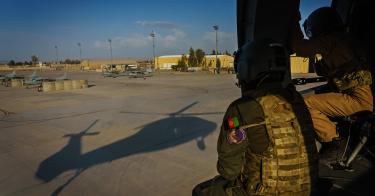The world watched in horror as a U.S. military plane carrying 640 Afghans took off from the airport in Kabul with people clinging to its exterior. We watched as several of them fell to their deaths after take-off. We wondered what could drive a person to such a desperate final act. The answer: for some, it is better to die clinging to a false hope of freedom than to die at the hands of the Taliban.
A severely botched U.S. withdrawal from Afghanistan has stranded more than 10,000 U.S. citizens there, as well as tens of thousands of Afghans who served as translators or assisted the U.S. government in other ways. Merely by working alongside U.S. government personnel, they put themselves and their families at risk. Many undertook those risks with the understanding that the U.S. government would provide them safety.
When President Biden first announced U.S. intentions to withdraw all troops before Sept. 11, 2021, it was not clear whether there was, in fact, a plan to ensure the safety of these brave Afghans. While those who served the U.S. government for a term of one or more years have been eligible for Special Immigrant Visas (SIV), processing times for SIV applications take nine months at best, and in reality often take far longer.
In an effort to accommodate principally Afghans who served the government for under two years, the Biden administration announced on Aug. 2 that certain Afghans would be eligible for Priority-2, or P-2, refugee status. P-2 status, according to the State Department, requires Afghans to relocate on their own dime to a third country in order to determine eligibility for resettlement. While these efforts are laudable, some, like Vox, describe Operation Allies Refuge as an “eleventh-hour plan.”
The U.S. government’s number-one job is to protect its citizens; it must get all remaining American civilians out of Afghanistan immediately. But the Afghans who risked their lives to ensure the success of U.S. efforts there deserve more than an afterthought. They deserve our best efforts to ensure their safety.
The window of opportunity is quickly closing for Afghans to flee the country. Hopefully, that window has not closed completely—especially as the Taliban begins its reign of terror. Reports are already circulating of the Taliban going door-to-door to murder people and sending frightening written warnings to individuals, especially women, former Afghan government officials and religious minorities (including Christians), saying that the Taliban knows who they are.
To the U.S. and the international community: The Afghan people don’t have nine months to wait in Afghanistan for their SIV application to process, nor do many have the financial or security resources to flee the Taliban-run Afghanistan to get to a third country to have their application processed. The focus for now should be to get people to safety—out of the Taliban’s reach—regionally and beyond.
Countries across the globe should be stepping up to at least temporarily receive fleeing Afghans. More than 60 countries say Afghans and others must be allowed to leave Afghanistan, but those same countries—and more—should go further and provide at least temporary safety and shelter.
Next, the UNHCR should work with many countries to vet and interview refugee applicants for refugee resettlement. The U.S. and Canada have committed to resettle tens of thousands of Afghans. Many more countries need to put skin in the game as well. This should be a global effort.
Although the U.S. withdrawal from Afghanistan has been chaotic, it is imperative that the Biden administration use the orderly U.S. Refugee Admissions Program process to vet and adjudicate these refugee applications. The administration should not repeat the Obama administration’s rushed, insecure process of setting unreasonable and dangerously high refugee numbers for Syrian migrants fleeing ISIS in 2016. U.S. Intelligence officials warned about such Syrian refugee operations back then, and their warning must be heeded now when we know terrorists occasionally exploit refugee flows to enter countries they target.
Unfortunately, the Biden administration’s efforts to throw untold resources at more quickly processing the hundreds of thousands of aliens illegally crossing the U.S. southern border will make it more difficult to adequately resource SIV and refugee processing of these Afghans, many of whom are fleeing true persecution. The Biden administration needs to get its priorities straight and focus on those most in need of protection.
To ordinary Americans: There are civil society-led pledge efforts to charter private planes to get Afghans out. If you have the capacity to donate to these efforts, you may play a direct role in ensuring the safe transport of countless Afghans. Furthermore, as Afghans are resettled into the U.S., there is a need for volunteers to help ease Afghan family’s transitions into life in the U.S. You can volunteer with your local refugee resettlement agency.
If you know Afghans who worked with the U.S. government and need to get to safety, the U.S. Department of State created a task force that is compiling the lists for evacuation. Afghan nationals in need of help can call or email the U.S. State Department to get their names on evacuation lists. There are different lines of effort currently underway, including efforts directed towards SIVs, P-1 and P-2 refugees, and others who do not qualify under any of the aforementioned designations. Afghan nationals should ensure that their names are on evacuation lists so that they can get out sooner rather than later.
In the face of such dire straits and an utter mishandling of the U.S. withdrawal from Afghanistan—everyone, but especially the Biden administration—has a responsibility to act and to do their part to get U.S. citizens and Afghans to safety.
This piece originally appeared in the Daily Caller.




